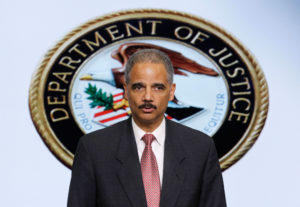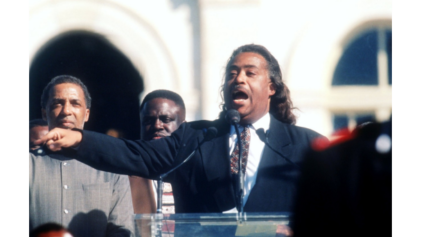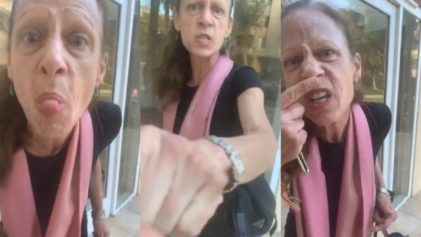
Attorney General Eric Holder has been pushing the Justice Department to revise the FBI’s use of racial profiling, but a story in the New York Times says the long-awaited revisions would still allow the FBI to continue many of the tactics that were most objectionable to civil rights groups, such as mapping ethnic populations and using that data to recruit informants and open investigations.
The Times quotes several current and former officials who say one of the main tenets of the new rules, which are still in draft form and soon to be made public, is to expand the definition of prohibited profiling to include not just race, but religion, national origin, gender and sexual orientation. The rules also attempt to elevate the standards agents must meet before considering those factors. But after the implementation of the new rules, the FBI would still be able to use nationality to map neighborhoods, recruit informants, or look for foreign spies.
The Times characterized the new rules as a “compromise” between Holder’s desire to protect the rights of minorities and the concerns of national security officials that new racial profiling rules would hinder their investigations of potential terrorists.
The ACLU has been assiduously tracking the racial profiling methods of the FBI and how it collects racial and ethnic information to conduct “mapping” of communities around the country “based on crude stereotypes about which groups commit different types of crimes,” in the words of the ACLU.
Called the “Mapping the FBI” initiative, the ACLU is trying to “expose misconduct, abuse of authority, and unconstitutional profiling and other violations of Americans’ rights and liberties across the country.”
“As our nation’s predominant law enforcement agency, the FBI should be tracking true threats, not wasting resources and inappropriately mapping American communities on the basis of race, ethnicity, national origin, or religion,” the ACLU said on its website in describing its initiative. “Law enforcement programs based on evidence and facts are more effective than a system based on racial stereotypes or mass suspicion. Yet, in the decade since 9/11, long-standing safeguards on the FBI’s investigative and intelligence collection activities have been erased, allowing it to engage in racial and ethnic profiling and to initiate intrusive investigations with little or no suspicion of wrongdoing.”
The ACLU has been taking on the FBI in the court and in Congress to try to take the teeth out of the organization’s abuse of Americans’ civil liberties.
Holder himself spoke out against racial profiling—as he has done in the past—in a speech at the annual convention of Rev. Al Sharpton National Action Network.
Holder said racial profiling undermines the relationship between communities and law enforcement officials, and told the audience about the advice his father gave him when he was a boy on how to interact with police if he ever felt he had been stopped unfairly.
“I thought of my father’s words years later, when – as a college student – I was pulled over twice on the New Jersey turnpike and my car was searched – even though I was sure I hadn’t been speeding,” he said, according to his prepared remarks. “I thought of them again some time after that, when a police officer stopped and questioned me in Washington while I was running to catch a movie – even though I happened to be a federal prosecutor at the time.”
“And I couldn’t help but think of my father just a couple of years ago when I sat down to convey the same message to my own teenage son after the shooting of Trayvon Martin – a conversation I hoped I’d never have to have,” he added.
Holder described plans to bring together “civil rights organizations and law enforcement leaders to identify areas of concern – and reduce the likelihood that race will play any role in the investigation and prosecution of crimes.”
“As it stands – in far too many places – a vicious cycle of poverty, criminality, and incarceration traps individuals, devastates families, and weakens communities,” he said. “It is long past time for us to break this cycle.”
President Obama is scheduled to speak at the NAN convention on Friday.


